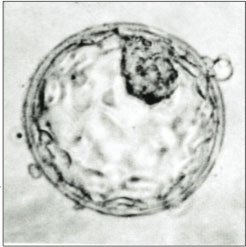We Asked, You Answered: Embryo Adoption
In vitro fertilization often involves the creation of more embryos than the genetic parents intend to gestate and birth. Embryo adoption is the process of receiving a genetically unrelated “extra” embryo who was created for in vitro fertilization, and giving that embryo the chance to implant in the adoptive mother’s uterus. Absent such adoption, these embryos may be destroyed, killed for research, or kept alive in a frozen state pending further action.
We asked our followers on social media: “What do you know about embryo adoption, and what are your thoughts on it?” Here are a few of the top responses.

Maria M.: “My friend has two children from embryo adoption. They are precious.”
Kim B.: “I think it is a good solution to a problem that already exists, but I am afraid of the potential it has to create suboptimal situations. I worry about health issues for people who have been embryos for so long. I worry about increased laxity with IVF because extra embryos could be adopted. Not saying any one of these things makes it wrong. I think it’s great, in theory, but… I would be more supportive of it if there was a way to also ensure the reduction in the number of embryos created by IVF. (It’s better than ‘destroying’ (killing) the embryos.)”
Calum M.: “Never understood why anyone objects to it, to be honest.”
Karen R.: “I wish there could be some sort of policy where adoption had to be pre-organized for all ‘extra’ embryos before fertilization procedures could begin. This would place importance on the fact that these embryos are, in fact, living human beings.”
Miranda S.: “It’s a good solution to a problem that we wish didn’t exist, but it doesn’t change the fact that the children that were (however unethically) created already exist and deserve to be treated as such.”
Wenslyn B.: “I considered it myself when we were dealing with infertility. We ended up pursuing IVF for ourselves. We had 3 embryos, and all were placed in the womb over time (2 survived, 1 did not). The center we used is pro-life and does not want to create a ‘surplus.’ So my friend who had 12 eggs harvested there was advised to only fertilize 5 and freeze the rest as eggs. I do feel that embryo adoption is a way to allow couples to conceive and experience the pregnancy and parenthood process ‘from start to finish.’ My aunt who adopted a newborn says she still feels at times that she wished she had the chance to carry her own daughter. I am not ethically opposed, but just like IVF, which I myself went through, I do not blanket recommend it.”
@antipersonhood: “If you’re LGBT+ it’s much harder to adopt an embryo because most embryo agencies are run by Christian conservatives.”
Emily B.: “We adopted 15 embryos. It’s a beautiful and loving way to grow a family while giving embryos a chance at life just like any other human! But it has to be understood that embryo adoption should not create a market for IVF.”
Amanda P.: “It can help a couple struggling with some certain fertility issues have and bear a child. I also think it is a caring way to handle the countless embryos that have already been created through IVF and provides an already created child the opportunity to develop (rather than be discarded or remain frozen/stored for an undetermined amount of time). I do, however, think it opens the door to exploitation and encourages the creation of more embryos, turning them into commodities and stripping them of human dignity.”
Megan B.: “I think it should only happen in cases where the embryo is literally either going to be destroyed or adopted. The children’s lives should be saved, but the hard part is that we don’t want to inadvertently support or fund the industry. I think the only way to do that is to only participate when it’s the only way to save the children. We won’t be able to save them all. But that is an evil for the doers to bear.”
@WriterOfMinds: “I know a couple who did it! I wish it weren’t necessary, but as long as there are ‘extra’ IVF embryos at risk of either being thrown away or staying stuck in a freezer forever, I think it’s a great thing for people to do.”
Micaiah B.: “I have friends trying to embryo adopt right now. I think it’s a life-affirming solution to the abandoned and unused embryos from IVF.”
[Photo credit: Human blastocyst via National Institutes of Health]
If you appreciate our work and would like to help, one of the most effective ways to do so is to become a monthly donor. You can also give a one time donation here or volunteer with us here.


